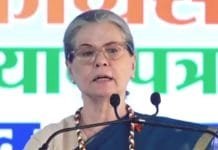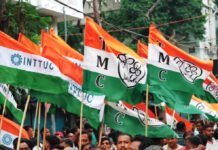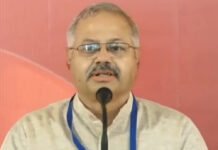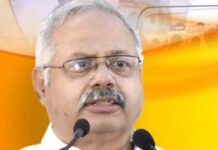
Arvind Kejriwal, AAP national convenor, raised serious questions to RSS chief Mohan Bhagwat regarding BJP’s leadership under Modi and Shah. Did the Sangh imagine BJP in this way? Explore Kejriwal’s concerns about Indian democracy and the RSS’s role in shaping BJP’s future.
Introduction
Indian politics is at a crossroads, and the ideological divide between parties seems to be widening. At the center of this political storm is Aam Aadmi Party (AAP) national convenor and former Delhi Chief Minister, Arvind Kejriwal, who has never been one to shy away from confrontation. Recently, in a bold and daring move, Kejriwal wrote a letter to the Rashtriya Swayamsevak Sangh (RSS) chief, Mohan Bhagwat, asking hard-hitting questions about the current direction of the Bharatiya Janata Party (BJP) under Prime Minister Narendra Modi and Union Home Minister Amit Shah. He raised pertinent questions about the ethics, governance, and future of democracy in India. One key question stood out in the letter: “Did the Sangh imagine BJP in this way?” Kejriwal’s message strikes at the core of India’s evolving political discourse.
In this article, we’ll break down Kejriwal’s letter, the questions he posed, and the broader implications of this ongoing political clash. Buckle up as we navigate the complex intersection of power, ideology, and governance.
Kejriwal’s Letter: A Call to Question BJP’s Leadership
Kejriwal’s letter wasn’t just an act of political posturing. It was a public challenge aimed directly at the heart of the BJP-RSS relationship. By addressing Mohan Bhagwat, the ideological and spiritual head of the RSS, Kejriwal wasn’t just criticizing the BJP; he was questioning the very roots of the party.
In his letter, Kejriwal raised four central questions that rattled the political sphere:
- Is it ethical to topple democratically elected governments?
- Why are corrupt leaders embraced after being called out?
- What role should the RSS play in guiding a straying BJP?
- Should laws apply equally, even to Prime Minister Narendra Modi?
Let’s dive into each of these concerns and explore the broader context of Kejriwal’s argument.
#1: The Ethics of Toppling Democratically Elected Governments
Kejriwal’s first question to Bhagwat addressed a tactic that has become all too familiar in Indian politics — the practice of toppling democratically elected governments through political defections, investigations, and behind-the-scenes maneuvering. In recent years, several opposition-led state governments have crumbled after mass resignations and defections by sitting legislators, often under the pressure of Enforcement Directorate (ED) or Central Bureau of Investigation (CBI) probes.
Kejriwal asked Bhagwat directly: “Is it right to topple an elected government in a democratic system by offering temptations or threats? Is this acceptable to the RSS?”
This question hits a sore spot in India’s democracy, where the sanctity of elections has come under scrutiny. Are we witnessing the death of political integrity in India, where the mandate of the people can be overturned with money, power, and coercion? For a party born from an organization like the RSS, which has long championed discipline and moral values, this question is one that needs urgent reflection.
#2: The Hypocrisy of Calling Leaders Corrupt, Then Embracing Them
Kejriwal’s second question to Bhagwat centered around the growing trend of BJP leaders publicly denouncing politicians as corrupt, only to welcome them into the party fold later. Kejriwal specifically referred to a speech made by Prime Minister Narendra Modi, where he accused a politician of being involved in a ₹70,000 crore scam. Yet, within days, that very politician was inducted into the BJP and even made a Deputy Chief Minister.
Kejriwal’s message was clear: “Did the Sangh imagine BJP would behave in this manner?”
This flip-flopping raises deeper questions about BJP’s approach to corruption. If a leader is corrupt when outside the BJP, how does joining the party miraculously cleanse them of wrongdoing? The selective moral outrage seems to betray the very ethos of honesty and transparency that the BJP once claimed to uphold.
The Modi-Shah Paradox
Kejriwal didn’t mince words when he criticized both Prime Minister Narendra Modi and Amit Shah for this political hypocrisy. By accusing leaders of corruption on stage and then shaking hands with them behind closed doors, Modi and Shah have blurred the line between political expediency and ethical governance. How long can this paradox sustain itself?
#3: BJP: Born from the RSS, But Now A Straying Son?
The third question Kejriwal posed was perhaps the most philosophical of all: What responsibility does the RSS have in steering the BJP back onto the right path?
The BJP was born in the ideological cradle of the RSS. For decades, the RSS has shaped BJP’s ethos and principles. However, as the BJP has grown into a political juggernaut, there have been murmurs of divergence. In recent times, top BJP leaders like Amit Shah and JP Nadda have made statements that appear to distance the party from the RSS. Notably, Nadda had famously said, “We don’t need RSS.”
Kejriwal captured this sentiment brilliantly: “Is the son now so grown up that he will start showing his eyes to his mother?”
This metaphorical framing lays bare the growing chasm between the BJP’s leadership and its ideological parent. The question now is whether the RSS will remain a silent observer or intervene to realign BJP’s actions with its original values.
#4: Unequal Laws: A BJP That Plays By Its Own Rules?
Lastly, Kejriwal raised the issue of unequal application of laws within the BJP. He pointed out that the BJP had enacted a law mandating retirement for leaders after the age of 75, which resulted in the sidelining of political veterans like LK Advani. However, when it comes to Narendra Modi, the rules suddenly don’t apply. Union Home Minister Amit Shah himself stated that the retirement rule wouldn’t apply to the Prime Minister.
Kejriwal’s final question to Bhagwat asked: “Do you agree that the law under which Advani ji was retired will not be applicable to Prime Minister Narendra Modi? Shouldn’t the law be equal for everyone?”
This pointed critique highlights what many see as the growing centralization of power around Modi. Is the BJP now more of a personality cult than a democratic institution? If the law only applies to some and not others, what does that say about the party’s internal democracy?
The Broader Implications of Kejriwal’s Letter
Kejriwal’s letter isn’t just a political jab at the BJP and RSS. It’s a reflection of the larger concerns surrounding India’s democratic processes and the shifting nature of political alliances. By questioning the RSS’s role in shaping BJP’s moral compass, Kejriwal is tapping into the wider debate about what kind of political culture India wants.
The Future of Indian Democracy
Kejriwal warns that if the current trajectory continues, Indian democracy itself may be at risk. His letter hints at a political culture where power is prioritized over principles, and where the electorate’s voice is often disregarded in favor of short-term gains.
RSS’s Response: Silence or Action?
Perhaps the most important outcome of this letter will be the response of the RSS. Will Mohan Bhagwat or the RSS leadership respond to Kejriwal’s concerns, or will they maintain silence? Does the RSS feel that the BJP has strayed from its original values, and if so, will it step in to correct the course? These are crucial questions that could shape the future political landscape.
FAQs
1. Why did Arvind Kejriwal address his letter to the RSS chief, not BJP leaders directly?
Kejriwal addressed his letter to Mohan Bhagwat because the RSS is considered the ideological parent of the BJP. He aimed to highlight the RSS’s responsibility in guiding the party’s actions.
2. What is the significance of Kejriwal’s reference to JP Nadda’s statement about the RSS?
Nadda’s statement that the BJP doesn’t need RSS reflects a growing independence of the BJP from its ideological roots. Kejriwal’s reference underscores this rift and questions whether the RSS still holds sway over the BJP.
3. How does Kejriwal view the current state of Indian democracy under BJP rule?
Kejriwal expressed concerns that the BJP’s actions, such as toppling elected governments and embracing corrupt leaders, are endangering the health of Indian democracy.
Conclusion
In his powerful letter, Arvind Kejriwal asked piercing questions that cut straight to the heart of India’s political and ideological future. From questioning the ethics of toppling governments to the selective application of laws, Kejriwal raised concerns that are being felt by many across the political spectrum. Most importantly, his central question lingers: Did the Sangh imagine BJP in this way? As Indian democracy stands at a critical juncture, the answers to these questions could very well shape the course of the nation’s political future.















